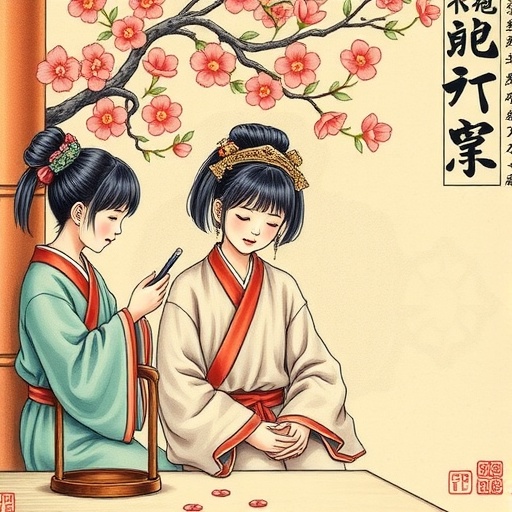In recent years, the integration of traditional health practices into the medical landscape has gained notable attention, particularly in China where cultural heritage greatly influences healthcare decisions. A recent cross-sectional study conducted by Hong, Gong, and Chen has shed light on the predictors influencing the willingness of Chinese college students to accept traditional Chinese medicine (TCM). Their findings, published in BMC Complementary Medicine and Therapies, underscore the importance of cultural beliefs and educational background in shaping students’ attitudes toward TCM.
The research was motivated by the rising popularity of TCM amongst younger populations in China and abroad. With Western medicine traditionally dominating academic circles, there is a growing curiosity about alternative therapies that emphasize holistic healing and preventative care. The allure of TCM, which includes practices such as acupuncture, herbal medicine, and qi gong, reflects a desire among students to explore their cultural roots while addressing modern health challenges.
Through their rigorous methodology, the researchers identified several key factors that significantly influence students’ willingness to embrace TCM. They developed a comprehensive survey that assessed participants’ beliefs about health, exposure to TCM practices, and their views on the efficacy of such treatments. With a diverse sample drawn from multiple universities, the results promised a robust representation of current attitudes among the youth in urban China.
One of the most striking outcomes of the study was the evident correlation between knowledge of TCM and its acceptance among students. Those who reported having received previous education on TCM, whether through formal coursework or personal exploration, exhibited a higher propensity to value and consider TCM as a viable treatment option. This finding highlights the critical role that educational institutions play in shaping health beliefs and practices among the younger generation.
Additionally, the study revealed that cultural identification significantly influenced students’ willingness to accept TCM. Students who expressed a strong sense of cultural identity and pride were more likely to endorse TCM practices. This aligns with broader sociocultural trends indicating that an increased appreciation for one’s heritage can lead to a greater acceptance of traditional health practices.
Moreover, the participants’ perceptions of TCM efficacy also emerged as a crucial determinant. In a world increasingly driven by evidence-based medicine, the belief in the effectiveness of TCM treatments can be a decisive factor in a young person’s decision-making process regarding their health. Those who recognized TCM’s potential benefits were less likely to dismiss it outright in favor of Western approaches.
The study does not merely reflect individual attitudes; it also raises salient questions about societal perceptions of health and wellness. As Chinese college students navigate the complex health landscape, they frequently encounter contrasting narratives regarding the merits of Western and traditional practices. This can create a sense of confusion, as well as an opportunity to rethink and reinvent health practices that resonate with their beliefs and experiences.
Interestingly, the researchers also noted the impact of peer influence on students’ acceptance of TCM. In environments where TCM practices are commonly discussed and endorsed, students reported feeling more open to exploring these methods themselves. This social dynamic suggests that cultural acceptance can flourish in collective settings, emphasizing the need for community-driven initiatives that highlight the benefits of TCM.
Furthermore, the study’s implications extend beyond the classroom. They illuminate potential pathways for healthcare providers and educators to cultivate a more inclusive approach toward health education. By integrating TCM principles with Western medical teachings, institutions can empower students to make informed decisions about their health based on a holistic understanding of various treatment modalities.
As the world continues to embrace integrative health models, understanding the factors that influence young people’s choices is crucial. The research presented by Hong et al. serves as a timely reminder that cultural factors, education, and social influences significantly shape health care attitudes. Such insights are invaluable for tailoring health education programs that resonate with younger populations, paving the way for more culturally competent healthcare practices.
Ultimately, this study contributes to an ongoing dialogue about the future of medicine. Acknowledging the interface of cultural heritage and modern health practices could lead to innovative solutions that honor tradition while embracing progress. As acceptance of TCM grows among young adults, the opportunity exists to bridge the gap between generations and foster a more comprehensive approach to health that values diverse healing practices.
In conclusion, the willingness of Chinese college students to accept traditional Chinese medicine underscores a critical transition in health attitudes that transcends mere preference. It reflects deeper cultural narratives and the evolving landscape of healthcare education. As we forge ahead, recognizing and harnessing this potential could significantly enhance health literacy and patient care for future generations.
Subject of Research: Predictors of willingness to accept traditional Chinese medicine among Chinese college students.
Article Title: Predictors of willingness to accept traditional Chinese medicine among Chinese college students: a cross-sectional study.
Article References:
Hong, J., Gong, B., Chen, Q. et al. Predictors of willingness to accept traditional Chinese medicine among Chinese college students: a cross-sectional study.
BMC Complement Med Ther 25, 410 (2025). https://doi.org/10.1186/s12906-025-05156-7
Image Credits: AI Generated
DOI: https://doi.org/10.1186/s12906-025-05156-7
Keywords: Traditional Chinese medicine, college students, willingness to accept, cultural beliefs, health education, integrative health.




